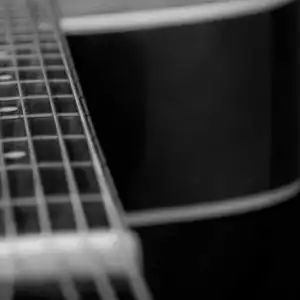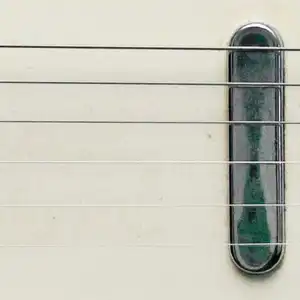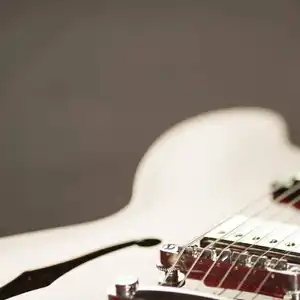Is Guitar Tone All In Your Fingers?


Be sure to subscribe to our YouTube channel to keep up with more great videos like this one.
Today we're tackling one of the most controversial issues in all of guitar—one that has been debated about for decades and decades and probably will continue to be debated about for further decades. Yes, I'm talking about whether tone is 100% in your fingers, or whether your tone is coming more from the gear that you're playing.The myth...
If you spend a lot of time online looking at guitar things like I do—and since you're reading this post, chances are that, that you do—then you've probably heard plenty of people commenting, whether on YouTube videos or in forums or what have you, that tone just comes from your fingers. It doesn't matter what gear you use. That has nothing to do with your tone. Tone is 100% just in the fingers. In these folks' minds, gear is, I guess, just a myth or something like that, or it doesn't really have any sort of effect on your tone whatsoever. Now, I don't really know what people are trying to say by this because obviously as anybody would agree, what gear you're playing through changes the tone of your guitar, it has an effect. But what I think they're really trying to say isn't that your amp or your pedals or your guitar don't have an effect on your tone. What they're saying is, what made Jimi Hendrix sound like Jimi Hendrix, wasn't the model of Strat that he played or how is pickups were wired or anything like that. It was just his actual fingers that were making the difference and made him sound like him.What do we think?
Right from the get-go, I should say that I don't think these people are necessarily wrong. I think it's easy for guitarists to get way more obsessed with the gear that they're playing through and think that a certain pedal or amp is going to make them sound like Jimi or Eric Clapton or what have you, just because they have the same gear. The reality is, [Hendrix and Clapton] have a very particular style that makes them sound like them. Honestly, I kind of wish people didn't say tone is in the fingers. I wish they would just say that style is in the fingers. Because your tone is a combination of how you play the guitar and the gear that you're using, but, your style is largely really based on your fingers themselves and how you're playing the guitar. So if people would just say style is in the fingers, I don't think anybody would argue with them, but of course that's not how they say it... They always say, tone is in the fingers, so we instead have this whole debate about whether it's gear or whether it's your fingers. Well, today we're going to talk about my perspective on all this. The way that you play your guitar certainly has a huge effect on tone. But your gear is also really important as well. In my opinion, tone is a combination of the way that you're playing and the gear that you're using. And the interaction of those two things is I think the most interesting part.The two different types of gear
So for our purposes today, I think it's really helpful to think of gear in two different categories. There's gear that you're actually playing—and here I'm talking about your guitar, the strings on your guitar, your Whammy bar system or Bigsby or a B-bender if you're a country player. And then there's more purely tonal gear, things like your guitar pedals, your cables, your pickups, your amp, all that sort of stuff that comes later in the chain. So first let's talk about the gear that you're actually playing. Things like your guitar strings, Whammy Bar, all that sort of stuff. That stuff I would say has a very strong effect on your actual tone, in two different ways. The first is that this gear is basically in charge of taking the notes that you're playing and the way that you're playing them, and translating them into a signal which eventually will get passed on through the rest of your chain. As a result, it's really important to pick the right gear here that's going to match your style or accent the style that you're playing in a way that you think fits. So playing the same riff on a Les Paul is going to sound totally different than playing the same riff on a Strat, even if you're playing it the exact same way. And then to that same effect, playing different gauge strings is going to change that as well.Gear can change how you play
The second feature of all this that I think doesn't get talked about nearly enough is that that gear is actually going to change the way that you're playing as well. It's not just translating your playing style into a signal. It's also shaping and morphing and changing the way that you're playing your guitar a little bit as well and changing your style. I think a lot of players are going to play very differently on a Strat than they would on a Les Paul. You're going to choose different notes. You're going to phrase things differently. You're going to play less or more notes just depending on the tone of that instrument, and then of course if we're talking about other things like a Bigsby or a Whammy system in general, or especially things like a B-bender, those are enabling you to actually play different notes than you would otherwise. You can't really do those same things without those tools. Especially looking at something like a B-bender. Those become a really important element of style, and they are changing the way that you're playing and all that sort of good stuff. So I think the really important way to view these things is that honestly, it's a two-way street. Not only is the gear that you're playing helping to translate the notes that you're fretting into your signal, but they're also changing the notes that you do select, and the way that you use vibrato on the fretboard. All those things that we consider your style are going to be shaped by what gear you're choosing and how you're playing. So I think especially with this category of gear, it's really, really hard to argue that your gear doesn't have any effect on tone, or that your tone is 100% is in your fingers.What about pedals & amps?
Now, while I think it's pretty easy for a lot of players when they hear it spelled out, to agree that this gear that you're actually playing like your B-bender, your guitar or whatever, is shaping the overall tone of your instrument or the tone of your playing rather. I think it's a little bit harder to visualize things like effects, or your amp, or your cables, or all that sort of other secondary stuff, having quite as big of an effect on your overall tone or your style. But honestly, I don't think that's true either. I think this tonal gear—your pedals, your amp or what have you—is doing basically the same thing that the gear that you're playing is. It's complimenting your style and helping to translate the style that you're playing into the overall finished tone and as a result, it's important to pick the right pedals or the right amp, if you choose to have any pedals at all, that will help to accent that style that you're already delivering to the pedals or the amp. But at the same time, they also have an effect on your playing style. Look at delay, for example. It's pretty safe to say The Edge wouldn't be playing the same parts, if he was playing 100% of a dry guitar, it wouldn't have nearly the tone. He's leaning into the delay, using the delay as an instrument, and that's what's creating his overall tone. But even if you're not using dotted delay or dotted quarter delays to create these big lush soundscapes like The Edge. I think it really still has an important effect on how you're playing. The way I'll play through a Klon overdrive is very different than the way I'll play through a Green Russian Big Muff or something like that. Gear choices like these change the way that I'm actually playing, the way that I'm actually fretting notes, and as a result, just like your guitar, they really shape your tone in both directions. They help to translate the tone in your hands into the tone that comes out of your amp, and they change your style and your notes that you're fretting and how you're playing it, how you select your notes, how often you play your notes, all that sort of good stuff. And as a result, I think honestly, this tonal gear has almost as much of an effect on your overall tone, as does things like your guitar and your guitar strings.So is there any truth to it?
So all that said, what I think this saying, "tone is 100% in the fingers," seeks to do is actually kind of a noble thing. I think especially for guitarists that haven't been playing that long, or guitarists that don't play that often, it's really easy to think that the missing element in your tone is just some pedal that you don't have, or to look up your favorite guitarist rig and see that they have these pedals on their board or this particular amp, and all you have to do to play like them is to get that piece of gear. What people are trying to tell you when they say tone is 100% in your fingers, at least as far as I'm concerned, is that you need to practice. You need to work on your style. You need to start right there at the most basic element of how you're playing your guitar, if you want to accomplish a certain style or a certain tonality. Then you can use these different tools like your guitar, your amp, or your pedals, to better accent and influence the way that you're playing your guitar.Putting it all together...
So all in all, in my opinion, is tone 100% in your fingers? No, it's an interaction of your gear and your fingers. But, should you use that as an excuse to not get better at playing? Also no. Don't lean on your gear too heavily, at least in my own opinion. Make it about your playing, about making better riffs, playing your style more authentically, making it all about how you're actually playing your guitar. Don't lean on your gear too much, but use it as a tool to shape your playing in both directions. So I know a lot of you probably have a lot of opinions about this. Like I said, this is a pretty controversial topic. I'm not speaking from a position of being god or anything. I'm not 100% right. This is just my opinion. If you agree with me, let me know in the comments. If you don't agree with me, definitely let me know in the comments. I'm eager to have a little bit of a discussion about it.Other Posts you may like

Guitar Strings Order: How the Guitar is Tuned and Why

Two Handed Tapping: Our Top 8 Tappers of All Time

Which Guitar Strings Wear Your Fret Wire Down More?

What is Nashville Tuning? Its History, Best Guitar Strings & Uses

Guitar Scale Length Explained: String Tension & Playability

What Guitar Strings I Used To Play...
0 Responses
Leave a Reply
Your email address will not be published. Required fields are marked *

